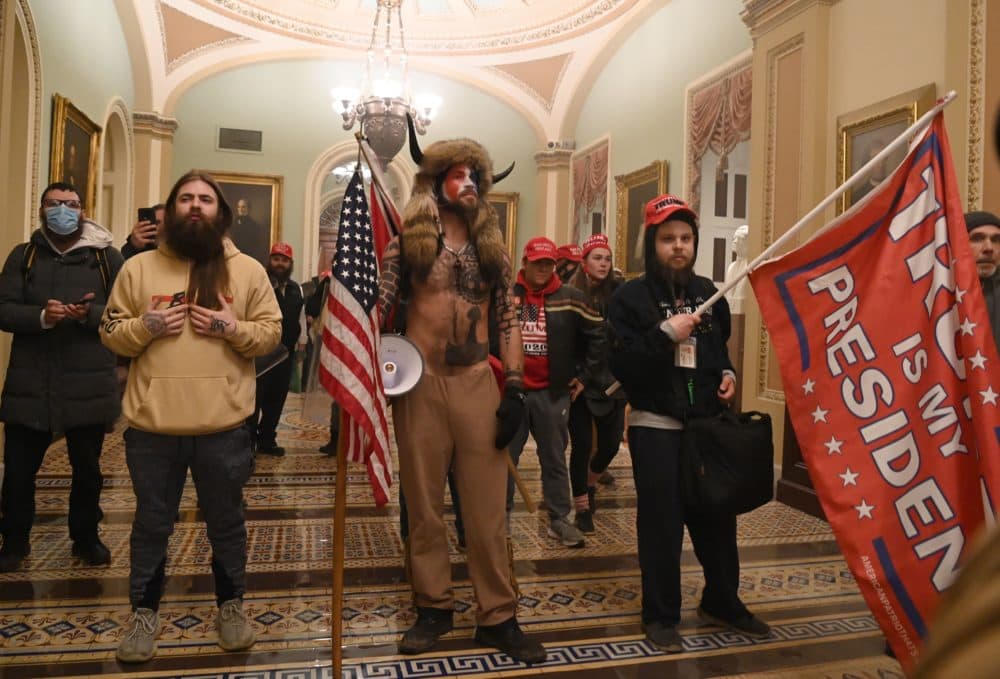Advertisement
First Person:
First Person: The Consequences Of America's 'Stupid Coup'
Resume
This radio diary is part of our hour on dark money and the insurrection. Listen here.
How does the world see America’s insurrection, the election and lies that preceded it, and the politics that followed it? What do they see, that Americans can’t see ourselves?
Indi Samarajiva lives in Colombo, Sri Lanka.
He's worried that Americans aren't worried enough about what's happening to U.S. democracy.
SAMARAJIVA: "There's a sense that you're protected by not feeling these things. And these feelings are there for a reason. To guide you through reality. Stop trying to be comforted all of the time.
"I think Americans are like children sometimes. Like, you're not children, you're adults. Sometimes you have to face the harsh reality of the world and do something about it."
What is that harsh reality? On November 10th, months before the insurrection, Samarajiva posted an extended article on Medium. He wrote: "You're being coup'd."
SAMARAJIVA: "What else do you call it? So, you give the guy who lost all the power and all the guns for a good 2, 3 months. So he had all that. And it's only because people are polite that it hasn't turned into a hard coup. But Donald Trump is not polite. So he changed the defense secretaries.
"He changed all the people in charge of the guns. And then he went across the street from the Capitol and he told people to go walk on the Capitol. If that isn't a coup, God knows what is. If it helps you, imagine that it's brown or Black people. And then you'll definitely call it a coup."
However, this isn't a tanks and helicopters kind of coup. Samarajiva calls what’s happening in the U.S. "a stupid coup."
Characterized by things like: A presidential lawyer gesticulating at Four Seasons Total Landscaping. QAnon conspiracies. A guy with face paint, wearing horns and bellowing from the Senate president's chair.
Samarajiva gets it. "Whether [the coup] fails or not, deep structural damage is done," he writes. "At the time, however, it just feels dumb."
Yes, people died at the Capitol that day. Yes, members of Congress feared for their lives. But Samarajiva understands the soothing allure of just calling it all a farce and forgetting about it.
He knows, because he lived through it. What he calls Sri Lanka's "stupid coup" of 2018.
SAMARAJIVA: "I was putting the kids to bed one night and then I got an SMS saying the president had replaced the leader of the House. And I was like, holy s**t."
"The coup was a farce at the time, but how soon it turned to tragedy," Samarajiva writes. "They called it a constitutional crisis, but how soon it became a real one."
SAMARAJIVA: "It was a presidential coup. Like, the president abused the powers they had and because he couldn't just bribe enough people to come over, they tried to basically use violence in parliament. But again, not at the scale that you guys had. We didn't have people die. They just threw chili powder and chairs.
"It was crazy. The Speaker of the House is this old dude, he's like 80-something now. And there were cops surrounding him with literally cushions because people were throwing books and broken chairs at him.
"There's like one photograph where some of our guys, they scared the Speaker of the House away and they went and sat in his chair. And they were sort of taking pictures in a chair they shouldn't have been sitting in. And I saw the same thing happening in America.
"Where some of your mob was sitting in the chair. And taking photos in a chair they shouldn't be sitting in. It's a symbolic thing but it's also a very real thing because they're occupying your seat of power."
In his Medium essay, Samarajiva writes, "I’m trying to warn you America. It seems stupid now, but the consequences are not."
SAMARAJIVA: "What I write about in that article is how a coup is like a blow, right. So someone can stop hitting you, and you're still injured. And we're still injured. And that had really long-term repercussions for us.
" ... It definitely changed the country. I mean, I think what people don't realize is by the time it gets to that point your country is already divided. And those fault lines will just sort of fracture as the months went on."
The Sri Lankan slow motion soft coup began in October 2018. Protests followed. As did several orders from the nation's highest court. By December 2018, the coup ended, and Sri Lanka's incumbent president was reinstated.
SAMARAJIVA: "After the coup happened, our government was destabilized. And at the time, I sort of went back to business. We got our old government back. And I was like, OK we can just go on with this. But what I didn't realize is that, you know, your government is doing something all the time."
Just four months later, Sri Lanka suffered one of the most horrific terrorist attacks in the country's history.
SAMARAJIVA: "What happened to us was a lot of national security alerts were missed. Or they weren't passed around because the government was still fighting within itself. And then we got hit with a major terrorist attack on Easter Sunday."
On April 21, 2019, a series of coordinated suicide bombings devastated Sri Lanka. Almost 270 people were killed; many, murdered while attending Easter services.
It was an act of domestic terrorism. All eight suicide bombers were Sri Lankan citizens associated with a local militant Islamist group.
Just weeks earlier, Indian intelligence services had warned Sri Lankan authorities of a possible attack. But that intel was never properly shared within the Sri Lankan government.
SAMARAJIVA: "And that to me was a direct result of the weakening of our government that happened after the coup."
"My wife and children were at church that day. Our regular church (where they hadn’t gone) had bombs on either side,” Indi Samarajiva writes. “I couldn’t understand the news when I first got it. And you cannot understand the fear until they were safely home. I do not want you to understand. But I fear one day you must."
SAMARAJIVA: "So you had a weakening of your government. And to be quite honest ... very, very obvious terrorist signals coming from your white supremacists. This thing's ringing like a five-alarm bell.
"You guys have people actively whipped into religious fervor about, you know, 'We need to stop the steal, we need to fight.' And they've been building up to this for decades. And I think your own intelligence agencies track this."
So what happens next? What lessons does Sri Lanka's very recent history of stupid coups and sickening violence have for the United States?
Samarajiva writes: "The tragic thing which you do not understand — which you cannot understand — is that you’ve already lost. You cannot know exactly what — that’s the nature of chaos."
SAMARAJIVA: "When I say you've already lost, look, a coup, I keep going back to it, but a coup is a blow. So if someone hits you and they stop hitting you, you've already been hit in the face. And so you already have some damage.
"So what's happened to America is you've already had the heart of your government hit. So you've already taken some damage. Your government is already weakened."
He warns that a damaged government can stay weak for a very long time.
SAMARAJIVA: "What happened in our coup is that the dudes who staged the coup are like ministers now. Like what they did was they destabilized and they caused all this chaos. And they said, Hey look at the chaos. Vote for us.
"And that's a pretty effective strategy. So it's not like it just stops on Inauguration Day. What I try to tell readers is, look, in Sri Lanka this was a generational change. Our cycle of violence started when I was 0 years old and it went until I was about 30."
He's talking about the Sri Lankan civil war that bled across the nation's history from 1983 to 2009.
SAMARAJIVA: "You're at the beginning of a cycle of violence, and that's just one thing I hope Americans can understand. I think maybe you guys kind of want the Amazon Prime subscription to history, where everything gets resolved tomorrow, you know, you want next day delivery on resolution.
"And I'm telling you, it doesn't work like that. And so it'll take a generational movement for this sort of thing to resolve. I think a lot of people might find that scary to hear. But then there's also some hope in that, if you are nice to your children, then your children can maybe — what I say is unf*** this, I don't know if you're allowed to say that."
But hoping for generational change is also a form of denial in the present. It's Americans today, proffering a powerless shrug, and dumping a broken country onto the backs of its children. We have already asked them to bear too much.
So we asked Indi Samarajiva — How does a nation defeat, at least, the willful blindness that hurts a democracy? What can be done now to beat back the stupid part of the stupid coup?
SAMARAJIVA: "So I guess there's two things I would say to the U.S. One is, you're in pain, like I think you need to feel that and you need to feel that things are bad. I think a lot of people might be trying to tell you, Oh, it's not so bad, it's not so bad. And it's like sometimes things are just bad.
"And I feel like pain is your body's way of telling you, like, I'm running into something. I'm hurt, like don't do this anymore. And I would tell you that Black people or say undocumented people, they've been saying, Hey, like, something's hurting us for a long time and you haven't listened. And now it's come close to you.
"So this idea of American exceptionalism, the idea that bad things can't happen to you, look, bad things are happening to you. And you need to feel that pain. I don't know what you do with that information, but my only message to you is the denial is just getting you more hurt, it's just causing more damage, it's just causing more trauma.
"And my other message is that people all over the world who you may have been used to looking down on, we've all gone through similar experiences. And you can sort of look to us and you can learn from the mistakes we made. Because God knows, we made a lot of mistakes.
"And that can help you. And I think this is actually a chance for Americans to leave the exceptional La La land they've lived in and to rejoin the rest of the world. But God knows, it's going to be a painful awakening."
In this diary ... we hear from:
Indi Samarajiva, a writer, living in Colombo, Sri Lanka.
Find his Medium page here. And his piece on 'stupid coups' here.
This segment aired on February 5, 2021.

